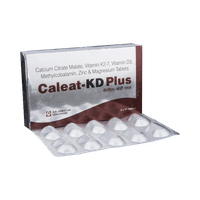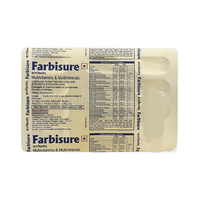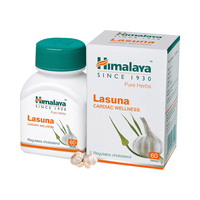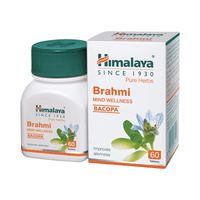Ivables M 5mg/50mg Tablet

Rs.194for 1 strip(s) (10 tablets each)
food interaction for Ivables M
alcohol interaction for Ivables M
pregnancy interaction for Ivables M
lactation interaction for Ivables M
food
alcohol
pregnancy
lactation
Ivables M 5mg/50mg Tablet is to be taken with food.
None
None
CAUTION
It is unsafe to consume alcohol with Ivables M 5mg/50mg Tablet.
UNSAFE
Ivables M 5mg/50mg Tablet is unsafe to use during pregnancy as there is definite evidence of risk to the developing baby. However, the doctor may rarely prescribe it in some life-threatening situations if the benefits are more than the potential risks. Please consult your doctor.
CONSULT YOUR DOCTOR
Ivables M 5mg/50mg Tablet is probably safe to use during breastfeeding. Limited human data suggests that the drug does not represent any significant risk to the baby.
SAFE IF PRESCRIBED
SALT INFORMATION FOR Ivables M
Ivabradine(5mg)
Uses
Ivabradine is used in the treatment of Angina (heart-related chest pain) and Heart failure.
How it works
Ivabradine is a heart rate lowering medication. It works by reducing the heart rate which lowers the oxygen requirement of the heart. As a result, the heart works more efficiently.
Common side effects
Slow heart rate, Luminous phenomena (Enhanced brightness), High blood pressure, Visual impairment, Atrial fibrillation, Increased white blood cell count (eosinophils), Angioedema (swelling of deeper layers of skin), Weakness, Increased creatinine level in blood, Itching, Heart block, Sick sinus syndrome
Metoprolol Tartrate(50mg)
Uses
Metoprolol Tartrate is used in the treatment of Hypertension (high blood pressure), Angina (heart-related chest pain), Arrhythmia, heart attack and migraine.
How it works
Metoprolol Tartrate is a short-acting beta blocker that works specifically on the heart. It works by slowing down the heart rate and makes the heart more efficient at pumping blood around the body.
Common side effects
Orthostatic hypotension (sudden lowering of blood pressure on standing), Slow heart rate, Headache, Dizziness, Nausea, Fatigue, Constipation, Diarrhea, Exertional dyspnea, Vomiting, Abdominal pain, Depression, Nervousness, Anxiety, Impotence, Change in alertness, Sleepiness, Insomnia (difficulty in sleeping), Paresthesia (tingling or pricking sensation), Heart failure, Arrhythmia (irregular heartbeats), Palpitations, Edema (swelling), Raynaud's phenomenon, Bronchospasm, Skin rash, Muscle cramp, Nightmares
SUBSTITUTES FOR Ivables M
2 Substitutes
2 Substitutes
Sorted By
 Rs. 219pay 9% more per Tablet
Rs. 219pay 9% more per Tablet Rs. 203.10pay 2% more per Tablet
Rs. 203.10pay 2% more per Tablet
Expert advice FOR Ivables M
- Ivabradine may cause dizziness or sleepiness. Do not drive or do anything requiring concentration until you know how it affects you.
- You may experience temporary changes in your vision such as enhanced visual brightness. These changes may occur within the initial 2 months of treatment and should gradually go away.
- Monitor your blood pressure when taking Ivabradine as it can increase your blood pressure.
- Monitor your heart rate when taking this medicine, as low heart rate is a common side effect. Inform your doctor if you experience symptoms of low heart rate such as dizziness, tiredness and low energy.
Frequently asked questions FOR Ivables M
Ivabradine
Q. What type of drug is Ivabradine?
Ivabradine is a heart medicine. It belongs to a class of medicine known as hyperpolarization-activated cyclic nucleotide-gated (HCN) channel blockers. It works by slowing the heart rate. This helps the heart to pump more blood through the body each time it beats.
Q. Does Ivabradine lower blood pressure?
No, Ivabradine commonly causes an increase in blood pressure as a side effect. This change is temporary and does not affect the treatment with Ivabradine. However, it should not be given to patients with severely low blood pressure (blood pressure < 90/50 mmHg).
Q. Is Ivabradine a beta-blocker?
No, Ivabradine is not a beta-blocker. It lowers the heart rate by selectively blocking the sodium channel present in heart pacemaker cells responsible for the increase in the heart rate.
Metoprolol Tartrate
Q. What is the difference between Metoprolol Succinate and Metoprolol Tartrate?
Metoprolol Succinate is an extended-release form of Metoprolol. This means it is released into your body slowly and only needs to be taken once a day. Metoprolol Tartrate, on the other hand, is available as an immediate-release tablet. It doesn’t stay in your body as long as Metoprolol Succinate does. Hence, multiple doses in a day may be required.
Q. Is Metoprolol Tartrate effective?
Metoprolol Tartrate is effective if used in the dose and duration advised by your doctor. Do not stop taking it even if you see improvement in your condition. If you stop using Metoprolol Tartrate too early, the symptoms may return or worsen.
Q. Which is better, Metoprolol Tartrate or Metoprolol Succinate?
Metoprolol Tartrate and Metoprolol Succinate are both effective depending on the condition being treated. Metoprolol Succinate is more effective for treating heart failure. Metoprolol Succinate may also be less likely to cause some side effects as compared to Metoprolol Tartrate.






















